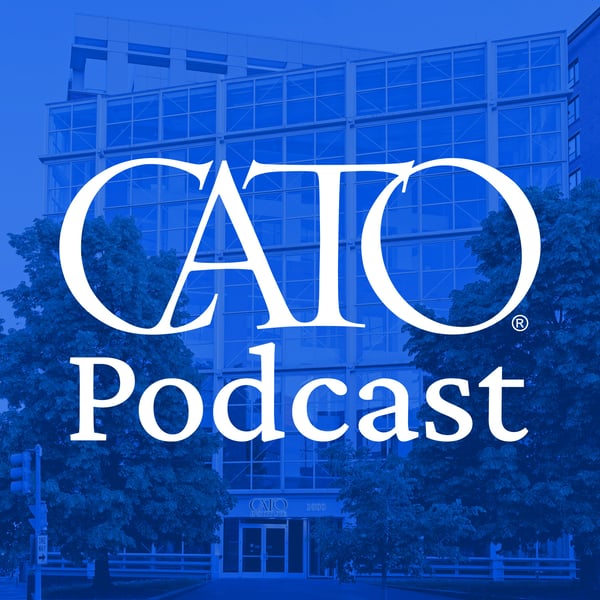Aimless Rivalry: U.S. and China in the Middle East
Cato Podcast
Cato Institute
4.6 • 949 Ratings
🗓️ 17 July 2025
⏱️ 25 minutes
🧾️ Download transcript
Summary
Justin Logan and Jon Hoffman delve into Hoffman's latest policy analysis, "Aimless Rivalry: The Futility of U.S. China Competition in the Middle East." They debunk justifications for U.S. Middle East policy based on competition with China and challenge prevailing narratives in international relations. Tune in for a thorough discussion that puts threats in context and examines U.S. policy through a skeptical lens.
Show Notes:
Jon Hoffman, "Aimless Rivalry: The Futility of US–China Competition in the Middle East" Policy Analysis No. 1000, July 10, 2025
Justin Logan, “Why the Middle East Still Doesn’t Matter,” Politico Magazine, October 9, 2014
Justin Logan, “The Case for Withdrawing from the Middle East,” Defense Priorities, September 30, 2020
Justin Logan, “Middle East Security,” Cato Handbook for Policymakers, 9th Edition, 2022
Jon Hoffman, "The U.S. Has Nothing to Fear from China in the Middle East" World Politics Review, December 6, 2023
Jon Hoffman, “U.S.-China competition and the value of Middle East Influence” Defense Priorities, June 10, 2025
Hosted on Acast. See acast.com/privacy for more information.
Transcript
Click on a timestamp to play from that location
| 0:00.0 | Welcome. I'm Justin Logan, the director of defense and foreign policy studies at the Cato Institute, and I'm here with my colleague. |
| 0:10.8 | John Hoffman, Research Fellow in Defense and Foreign Policy Studies at the Cato Institute. |
| 0:15.1 | Thanks for having me, Justin. |
| 0:16.3 | My pleasure, John, and has just published notably Policy Analysis Number 1000. Great milestone for the Cato Institute. It was released July 10th. And it's titled aimless rivalry, the futility of U.S.-China competition in the Middle East. So the first question that I wanted to pose to you, John, is how is it possible to justify a U.S. Middle East policy |
| 0:38.7 | on the basis of competition with China? Who's making this case and what are they saying? |
| 0:43.5 | Sure. So I'd say the way China factors in is since China in great power competition more |
| 0:50.8 | generally has become the guiding principle of U.S. foreign policy. I would say this has been |
| 0:56.7 | selectively applied to almost every region on planet Earth now. And of course, it's found its way |
| 1:01.6 | into the Middle East as older arguments such as oil or terrorism or so on and so forth have |
| 1:09.1 | kind of gone out of fashion. They're still used, but, you know, there's a lot of holes have been poked in those theories. This underlying idea of, oh, well, we can't leave because China is going to come in and eat our lunch is kind of the prevailing consensus now of why we need deep engagement. What is it that we're afraid they're going to steal from us in the Middle East? I mean, let me tell you my story about the Middle East that you've heard 10,000 times in my office, which is we've spent between $7 and $9 trillion over the past couple of decades in the Middle East. We don't have a heck of a lot to show for it other than several thousand dead Americans, a lot of madness and mayhem on the ground there. What are we afraid China's going to take? |
| 1:44.6 | Is there some great pot of magic beans over there that they're going to steal from us? |
| 1:48.3 | I think really the first thing is this idea of just zero-sum competition whereby any form of Chinese gains in the Middle East is inevitably our loss. |
| 1:58.5 | I obviously don't agree with this, this framing, but it's this |
| 2:01.5 | idea that rooted in this, in American primacy, that the United States needs to be the number one |
| 2:08.1 | dominant actor in the region and that China encroaching on its territory somehow undermines |
| 2:13.3 | U.S. interests. But that's always, those U.S. interests are always left, you're left wondering what |
| 2:19.5 | exactly those interests are and how China would tangibly threaten those. And in the paper, |
| 2:25.1 | I really detail that China's greatest interest in the Middle East is economic in nature. |
| 2:29.6 | It's the free flow of oil out of the region. We share that interest. But those who really advocate for |
| 2:35.8 | this strategy, one of the number one reasons, you know, kind of the, the General Corrilla argument |
| 2:41.2 | is... General Carilla, the erstwhile, Sencom commander. Yes, exactly. Who, what, retires August? |
| 2:49.6 | If he's not out already, yeah, he's on the way out. Yeah. So it's kind of that line of thinking whereby we need to stay deeply rooted in the Middle East because in the event of a hot war with China, we could close the oil straits in the Middle East and block the flow of oil to China in the event of a war. |
... |
Please login to see the full transcript.
Disclaimer: The podcast and artwork embedded on this page are from Cato Institute, and are the property of its owner and not affiliated with or endorsed by Tapesearch.
Generated transcripts are the property of Cato Institute and are distributed freely under the Fair Use doctrine. Transcripts generated by Tapesearch are not guaranteed to be accurate.
Copyright © Tapesearch 2025.

